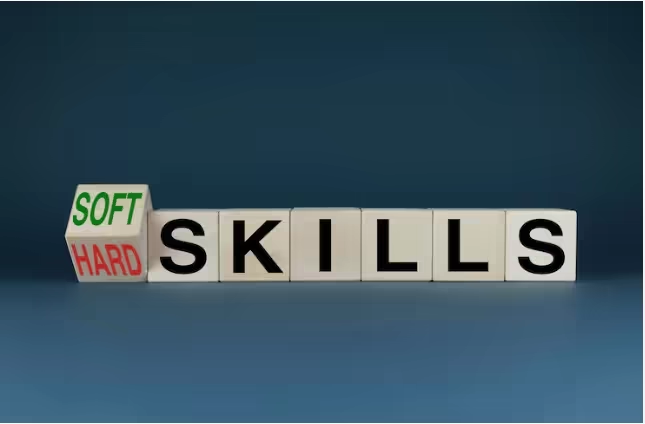Introduction
Employers frequently seek a blend of hard and soft skills in job descriptions. Hard skills include technical knowledge and training, whereas soft skills are human characteristics such as leadership, communication, and time management. In most careers, both talents are required to perform well and grow.
Hard skill vs. soft skill
The primary distinction between hard and soft talents is how they are acquired and applied to the job. Hard skills include how to operate a certain machine, software, or tool. Education or specialized training are frequently used to acquire hard skills.
Soft skills are personality attributes you have spent your entire life honing. They come in handy whether you are trying to organize your time, communicate with others, or face a challenging circumstance for the first time.
Employees learn hard skills through schooling and on-the-job training, whereas soft skills are developed throughout life through various professional and personal experiences.
Hard skills are quantifiable and may be stated in numbers or yes/no answers. Soft skills, however, are sometimes intangible or difficult to quantify and are typically defined using qualitative scales.
The value of hard skills is that they are the foundation of the services or goods that your company delivers. Hard skills training guarantees that you can do well in your respective fields.
Resumes, portfolios, job-related activities, and role-specific interview questions can all be used to assess hard skills.
Soft skills, however, are best assessed by asking situational and behavioral interview questions, employing soft skills questions and tests, and considering a candidates general personality qualities during the recruiting process.
Soft skills are required to establish a happy and effective work environment, whereas hard skills are required to accomplish technical duties in a job properly. As a result, businesses frequently seek candidates who have demonstrated soft and hard talents. Some companies may prefer applicants with a stronger collection of soft skills over those with a strong set of hard talents, as soft skills can be more difficult to develop.
What are hard skills(list examples)
Job-specific hard skills, also known as technical skills, apply to each job position. To put it another way, each role in each organization will need a distinct set of hard talents.
Examples of these are:
- An Accounting clerk would need to know how to handle and process transactions in line with financial reporting standards.
- An Accountant would need to have the hard skills held by the Accounting clerk, but additionally skills in developing reports, interpreting data, and influencing strategic decisions.
- The Financial Manager would need all skills held by the accountant as well as the exposure and experience to make strategic decisions and project future performance in an integrated manner.
With hard skills, there is a build-up as the position progresses in the organization. This is not necessarily the case with soft skills.
The following are some of the most in-demand hard skills according to Indeed.com
- Multilingual or bilingual
- Database administration
- Adobes software package
- Network safety
- Marketing with SEO and SEM
- Analytical statistics
- Exploration of data
- Development of mobile devices
- Designing a user interface
- Management of a marketing campaign
- Management and storage systems
- Languages for programming (such as Perl, Python, Java, and Ruby)
What are soft skills(list examples)
Soft skills are personality attributes that are related to general characteristics. Some soft talents are desirable in all employees, regardless of their position or level of competence, while others are useful in some posts but not others.
The following are some of the most in-demand soft skills according to Indeed:
- Integrity
- Dependability
- Effective communication
- Open-mindedness
- Teamwork
- Creativity
- Problem-solving
- Critical thinking
- Adaptability
- Organization
- Willingness to learn
- Empathy
Related: Examples Of Soft Skills
How to include Hard skills and Soft skills on a resume
Consider adding a "Skills" section to your resume when revising or constructing it. Examine the job description of the job you are applying for; for ideas on what to include and prioritize in your skills section. This area should showcase your skills that are most relevant to the employment. This is especially critical for jobs that need specialized abilities.
Employers mention hard and soft skills required for the job in the "requirements," "education," or "desired skills" parts of a job posting.
Both hard and soft talents are required for job advancement. Although people acquire and develop these talents differently, hard and soft skills may be learned and developed before applying for jobs.
Related: Soft Skills in Resume: Everything you need to know
How to get both skills
The best way to go about gaining skills is through training. The type of training is contingent on your situation and the required abilities. Starting with a training requirements analysis will help you establish the skills you need and determine which technique would work best.
To train for some of these abilities, you might want to look at eLearning choices, particularly mobile micro-learning tools that are easy to return to.
The objective is to enroll in relevant, interesting, and supportive skills training that supports the traits you require to execute your job.
After training, it is important to apply the skills in your day-to-day work to develop them. This is a full-proof way to ensure that the skills are maintained and continuously grow.
Finally, seek feedback from colleagues and professionals to determine how you have improved. If you have no third party to give you a review, introspection can be just as useful.
Related: 15 Best online courses sites that will boost your skills
Yolanda Chimonyo is a Strategy and Performance Management Consultant at Industrial Psychology Consultants (Pvt) Ltd, a management and human resources consulting firm.
Phone: +263 242 481946-48/481950
Email: yolanda@ipcconsultants.com
Main Website: www.ipcconsultants.com

